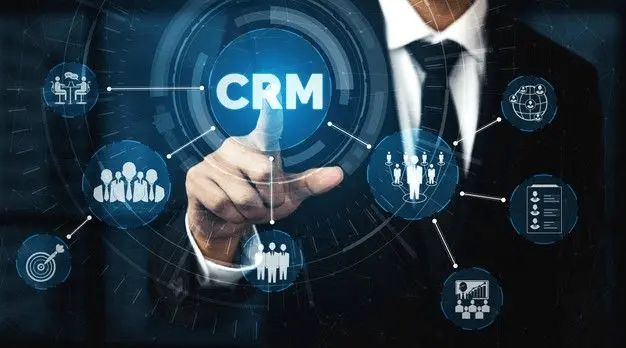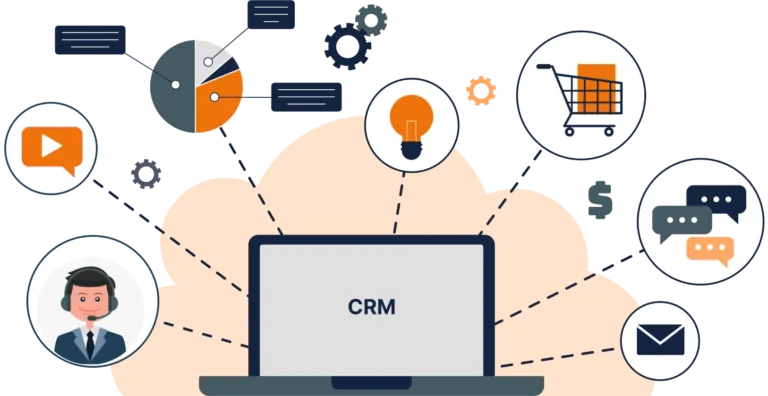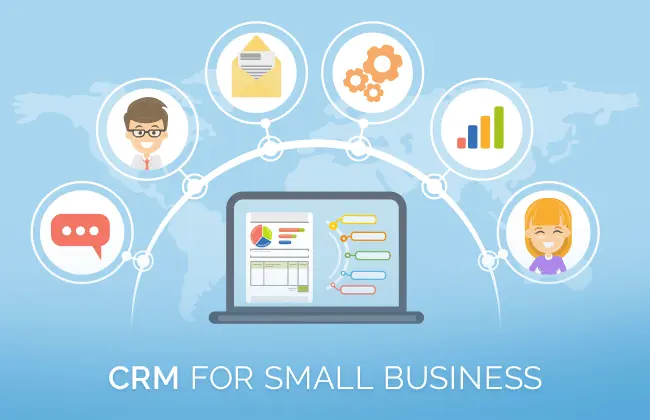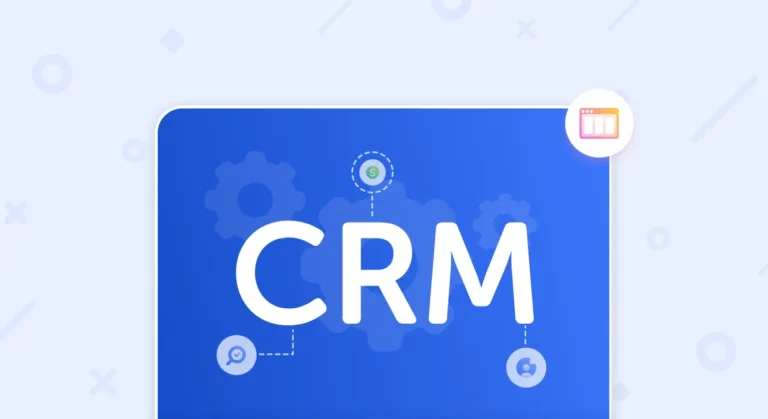Custom CRM Development: Benefits, Challenges, and Future Trends
Custom CRM Development
Custom CRM Development, also known as tailored CRM Software Development, is a method of creating a Customer Relationship Management software from the very scratch, which aims to fulfill a business’s demands or goals. CRM is a technology that helps organisations interact with potential clients, existing customers, and past clients. Essentially, CRM enables companies to enhance their communication and customer service, ultimately aiding in sales growth.
The CRM System has access to all customer information, such as contact details, the past purchases they made, along with the coverage of the entire customer journey, how they got to know the brand, what purchases they made, and how was their experience with the business. Businesses depend on CRM for managing their sales, their advertisements, and the services they provide to customers.
This essay will define the Custom CRM development, its applications, the challenges it has to face, and the future of Custom CRM Development.
Gaining the concept of Custom CRM Development
As mentioned earlier, Custom CRM Development is the process of planning and coding the CRM system to align with businesses.
Why businesses choose it:
Businesses use Custom CRM as it provides unique features like advanced support, multilingual support, or section-specific compliance, whereas Standard CRM provides the general basic functions. Businesses want CRM that can smoothly integrate with ERP, HR systems, or e-commerce platforms.
Market Adoption:
Different fields like banking, healthcare, and retail have a high demand for a Custom CRM for their regulatory compliance and data ownership. For Example, a Hospital CRM can use Electronic Health Records (EHR) in order to enhance the experience for patient follow-up, which generic CRMs can’t handle easily.
Benefits of Custom CRM Development
The Custom CRM makes itself superior to the standard one due to the following reasons
Customizable as per Business Needs
Custom CRM can be tailored according to the demands of business, as to take example, a Real Estate CRM can manage better property listings and buyer demands, rather than the standard CRM. Custom CRM ensures process integration with perfection, hence reducing inefficiencies.
Capabilities to Connect
Custom CRM integrates workflow automation, ERP, AI assistants, and even payment gateways. As Shopify Merchants build a Custom CRM to integrate sales dashboards, inventory, and order tracking systems.
Expandability and Versatility
Off-the-shelf CRMs, as it is pre-built, ready-to-use software, may force businesses into a rigid structure, whereas Custom ones are flexible according to the demand and needs of the business in real-time. Netflix integrates a Custom CRM to connect with its global subscribers and allows them unique personalization.
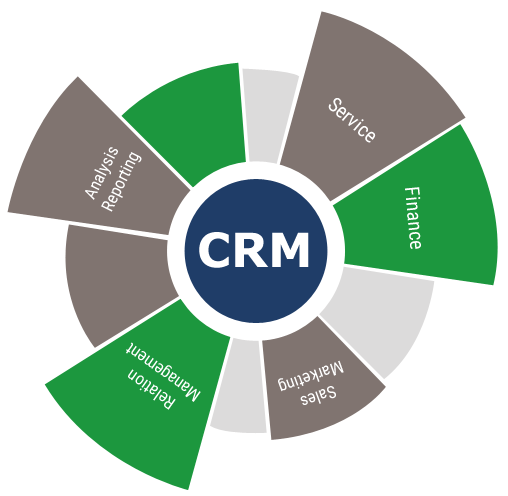
Challenges faced by Custom CRM
Although Custom CRM has a significant positive impact on businesses, it still presents many drawbacks that a company must manage, such as integration costs, ongoing maintenance, time consumption, technical issues, poor customer adoption, and the challenge of thoroughly defining demands and needs.
Integration cost
The investment demanded for a Custom CRM may be higher than for an off-the-shelf one, which may be an issue for the small business, as they may hesitate to invest a large amount in fear of failure, leading to their investment being wasted. Before the investment, businesses should critically evaluate the long-term benefits of Custom CRM. The implementation can be divided into phases, and the finance can also be cut into sections so that the insecurity of small businesses about investing huge money at once can be settled.
Routine Maintenance
To keep pace with the ongoing trends, real-time information, Custom CRMs require routine maintenance. Ignoring the need for maintenance can lead to data insecurity, system inefficiencies, and loss of competitive advantages. Businesses should designate resources for the up-to-date maintenance, either by gathering user feedback or by tracking performance metrics to help with ongoing maintenance.
Failing to define the demands correctly
For a business, it is very critical to define the needs, whether it’s elevating sales or enhancing customer service, while tailoring the CRM. Failing to define clear goals may lead to chaos and confusion. The business has to be very clear about its demands, its facts, and figures. Setting the crystal clear objectives and goals may prevent the disturbance.
Time Consumption
The difficulty of large-scale customization, connecting with already existing systems, may demand significant time, monetary investment, and expertise. Business may be more demanding, expecting the large project to be completed in a certain time period, which may cause hurdles and worries. To address long-term consumption, setting clear objectives, setting up a dedicated cross-functional crew may prove beneficial.
Poor User Adoption
If the system is too complex or isn’t user-friendly, the users may or may not be able to adapt. This can also happen if the team isn’t on the same board, leading to resistance, causing poor user adoption. Addressing the user concerns, their worries about the change, and assuring them of a user-friendly CRM system may help the team to embrace change.
Technical Issues
Technical Issues may arise during the implementation of Custom CRM, which may lead to delays, financial crises, and project failures. Resolving the technical issues on time, managing the crisis is super critical for the efficient integration of the Custom CRM.
Future Trends in Custom CRM Development
Mobile CRM
Mobile CRM refers to a system that manages customer interactions and activities and is specifically designed for smartphones and tablets. With Mobile CRM, many different teams like Marketing, Sales, and IT can manage customer data by tracking their history and communicating with customers while on the go. This remote system encourages businesses to provide the best customer experiences.
The significant role that Mobile CRM plays is boosting the productivity of sales team. The updates from customer data come in real time, no matter where they are, thus eradicating the need for manual entry of data.
Also, Mobile CRM increases efficiency by ensuring decisions are made in real time.
Integration with IOT
The integration of Internet of Things (IOT) connects devices like wearables, sensors, and smartphones to CRM system, allowing businesses to have real-time access to data from connected devices so that it can align directly to customer profiles.
This increases the chances for personalization by interpreting and analyzing the past purchases, the buying history, and customers’ preferences. Also, IOT helps connect information from different devices to CRM system for in-depth client activities
The security issues for IOT may be prevented by,
- Two-factor verification of the device
- Firmware updates
- Segmentation of Networks.
AI and Machine Learning
The concept of AI and Machine Learning integration is remarkably transforming CRM software development. Through such technologies, businesses may have a thorough and deeper view customer behaviors and priorities, delivering more personalized experiences. Through AI-powered experiences and analytics, businesses can have a very thorough observation of their customers.
AI interprets and analyzes the customer purchase history to provide them with their preferred personalized options, promoting personalized strategies.
AI-powered chatbots are playing an essential role in enhancing customer service
Hyper personalization
Hyper-personalization goes beyond typical personalization as it leverages AI, machine learning, behavioural analytics, and real-time data to deliver a personalized experience discreetly.
As customers expect brands to assume their needs without them asking for it, generic CRM isn’t enough anymore. Hyper-personalization uses data from different touchpoints to suggest the most suitable option for customers according to their needs and desires.
Custom CRM addresses unique business requirements and customer priorities, thus increasing customer satisfaction.
Enhanced Data Security and Privacy
CRM stores sensitive data such as customer profiles, buying history, and payment credentials. With the day-by-day increase in information breaches, securing the client information has become much more vital. Privacy regulations such as GDPR, CCPA, and HIPAA demand stricter compliance in handling personal data.
The data may be secured in the following ways,
- Confirming that all customer data, either in transit or at rest, is encrypted.
- Timely identity verification rather than just one-time authentication
- Limiting the data visibility only to employees of concern.
- AI-powered threat detection can help in the identification of unusual activities and the prevention of breaches in time.
Conclusion
Custom CRM Development appears as a crucial requirement for businesses aiming to build stronger, data-driven connections with their customers. In contrast to off-the-shelf CRMs, Custom CRMs offer flexibility, scalability, and alignment with distinctive business processes. Although Custom CRM may face challenges like high integration cost, poor user-adaptation, more time consumption, and technical issues, these can be mitigated by best user training, agile development, and segmentation of the finance.
The future for Custom CRM development holds as AI and Machine Learning integration is peaking, the personalization according to customers is in demand, as well as integration of IOT is helping track the customer activities, hence providing them with the most preferred and relatable options. So, to put it in conclusion, Custom CRM isn’t just a short-term investment, but it is definitely a strategic approach to managing customer interactions, preferences, and personalizations.


